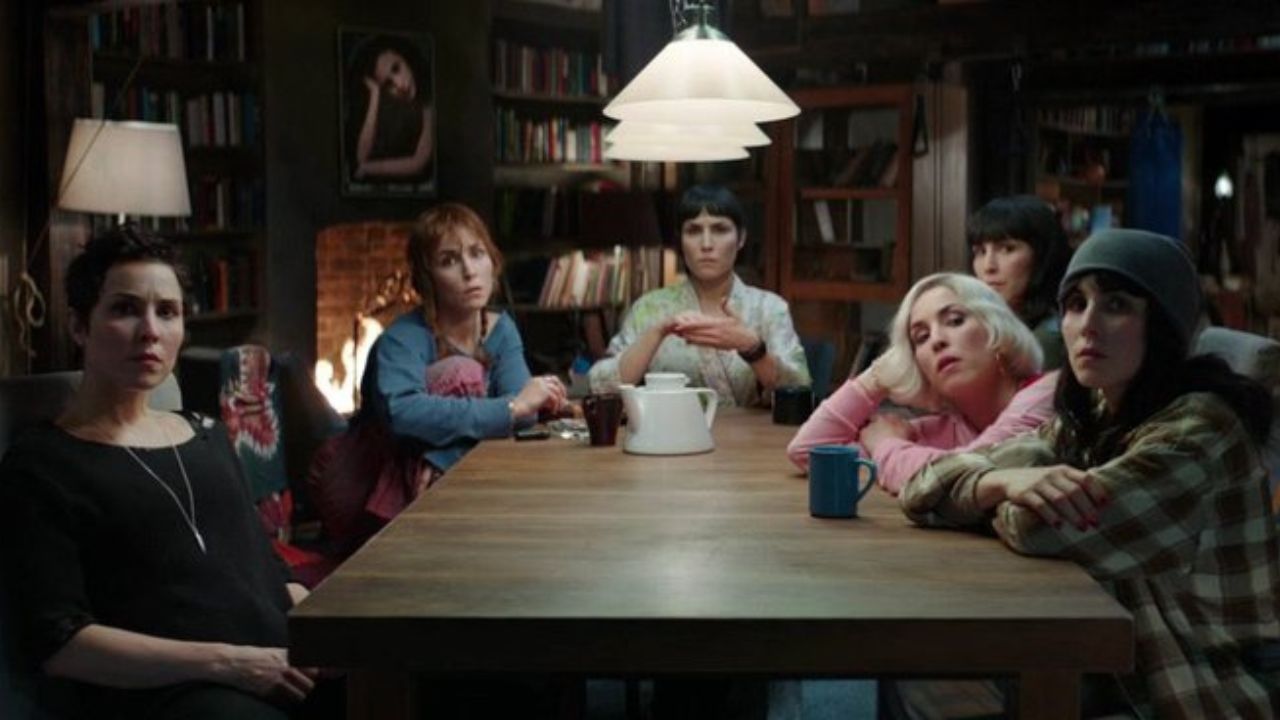This post includes a brief analysis and an explanation about the ending of “What Happened to Monday” (2017). Beware of spoilers.
Directed by Tommy Wirkola, the 2017 sci-fi thriller stars Roomi Rapace as the seven Settman sisters, Glenn Close as Nicolette Cayman and Willem Dafoe as Terrence Settman.
Table of Contents
The film “What Happened to Monday” is about seven identical sisters who live in a world where only one child per family is allowed. They share one single identity together: Karen Settman. The philosophy behind this dystopian world was founded by Nicolette Cayman. She is the head of the Child Allocation Bureau (CAB), the organization that makes sure everyone follows the rules.

What Happens in “What Happened to Monday”? (Plot Explained)
One day, Monday goes missing. The remaining sisters devise a plan and investigate Monday’s disappearance. In the process, they find out that the CAB is using illegal methods to take care of the “extra children” in society. Basically, the organization is exterminating them instead of putting them into cryosleep.
Meanwhile, the sisters find out that Monday had a secret life they didn’t know about. First, she had a romantic relationship with a man named Adrian, a security guard working for CAB. Second, she made a deal with Cayman. Monday is pregnant with twins and in order to ensure her children’s safety, she agrees to sacrifice her sisters to Cayman.
At this point, there are only two remaining sisters: Tuesday and Thursday. They go after Monday to confront her. Thursday and Monday engage in a physical fight, which leaves the latter badly wounded. At Cayman’s event, Tuesday and Adrian broadcast the illegal practices in the CAB. One of Cayman’s henchmen shoots Monday. Before dying, the eldest Settman asks Thursday to take care of her twins.
The Ending of “What Happened to Monday” Explained
“What Happened to Monday” ends with Cayman’s downfall and the abolition of the Child Allocation Act. After Monday’s passing, Adrian and the remaining sisters watch his unborn twins grow in an artificial womb. And they are not the only ones. There are many more children in the facility.
Significance of Monday’s Pregnancy
Monday’s pregnancy plays a pivotal role in the ending of “What Happened to Monday”. She is carrying twins, which is a clear violation of the one-child policy. The revelation of her pregnancy, along with her secret life with Adrian, reveals her desire to have her own identity. She saw it as an opportunity to have a normal life free from the constraints of a shared identity.

The Impact of Monday’s Betrayal
Monday sold out her sisters to Cayman, which led to the capture and death of many of her sisters. This revelation shows Monday in a new light. She went from a victim of an oppressive system to a willing participant. Monday’s controversial decision highlights the human instinct to protect their loved ones, even if that means sacrificing innocent people.
Meaning Behind the Ending Scene
The ending of “What Happened to Monday” suggests that overpopulation has a cost that most are unwilling to pay. Although the remaining Settman twins managed to save Monday’s babies, society as a whole still hasn’t solved its biggest problem. Overpopulation will eventually put humanity in a very precarious position.
“What Happened to Monday” Analysis and Themes
The film “What Happened to Monday” is a gripping tale about identity and survival in a society bound by strict laws. Through the Settman sisters and their struggles, the film highlights the lengths individuals are willing to go in order to ensure their own survival. Not only that, but it also portrays the hypothetical implications of a totalitarian regime governed by draconian laws.
There are three main themes explored in “What Happened to Monday”: overpopulation, identity and oppression. According to the dystopian society depicted in the film, overpopulation led to a lack of resources. In other words, there is not enough for each individual in society. The scarcity then led to extremist thoughts, which were the main foundation behind the one-child policy.
Identity is another major theme in “What Happened to Monday”. The seven sisters, despite being identical, each had their own personality. They were able to develop and maintain their own individual identity within the confines of being “Karen Settman”.
Last but not least, the film also highlights the dangers of giving someone too much power. Nicolette Cayman was a strong believer in the one-child policy. However, her conviction also led her to create a totalitarian and oppressive organization. In her quest to solve overpopulation, Nicolette Cayman overlooked some fundamental human rights, such as reproduction.

Discussion
The big problem in “What Happened to Monday” is overpopulation. Nicolette Cayman tried to solve it by reinforcing the one-child policy in society. This measure was, of course, controversial for moral, ethical and constitutional reasons.
Although many viewers might feel pleased with the ending of “What Happened to Monday”, keeping the status quo before the Child Allocation Act doesn’t help much. It’s indeed true that horrible atrocities were committed at the Child Allocation Bureau, but the real question is: “What now?”.
When a particular region of the world faces an overpopulation problem, scarcity of resources will eventually become a permanent challenge. The film ends with a self-righteous tone about “doing the right thing” but fails to provide practical solutions for the on-going problem.
Now, this might be a very unpopular opinion, but Nicolette Cayman was not wrong about limiting the reproducing rights of lower-income individuals. Usually, people from impoverished areas tend to have more children due to a lack of parenthood planning. This usually results in more poverty because more people share the already limited resources.
Final Thoughts
“What Happened to Monday” has an intriguing and captivating premise. As a viewer, it was interesting to watch seven identical sisters who share one identity and one apartment. Also, the origin behind their names was a “nice touch”. Each name corresponds to a day of the week, and they can only “go out” during their day.
The film has an adequate pace, which keeps the audience entertained and wondering what’s going to happen next. There are definitely some interesting plot twists as the story unravels, but the ending was a bit lacklustre. For instance, the final confrontation between Monday and her sisters felt a bit rushed and anticlimactic.
In addition, “What Happened to Monday” fails to explore the deeper themes and moral dilemmas that it raises. In my opinion, Nicolette Cayman is not the real villain of “What Happened to Monday”. She is merely a product of an oppressive system that values efficiency over humanity. Instead of challenging the audience, the film settles for a simplistic ending. Letting things be doesn’t provide any real solutions to the complex overpopulation problem.


